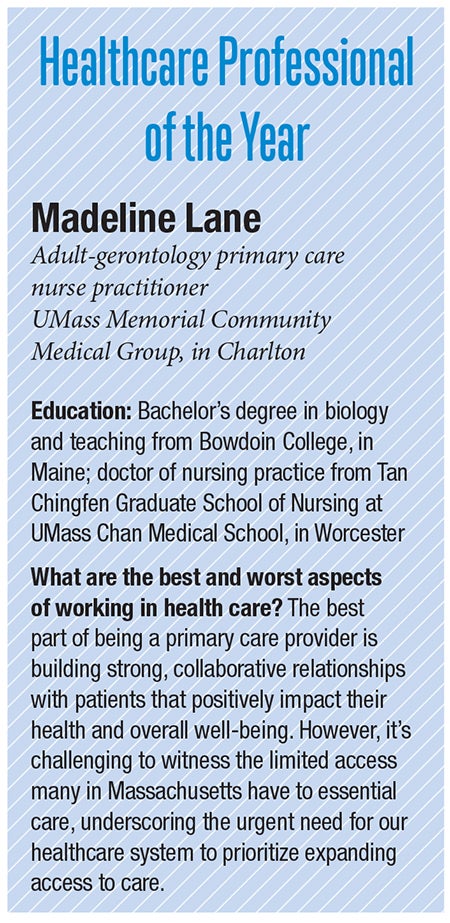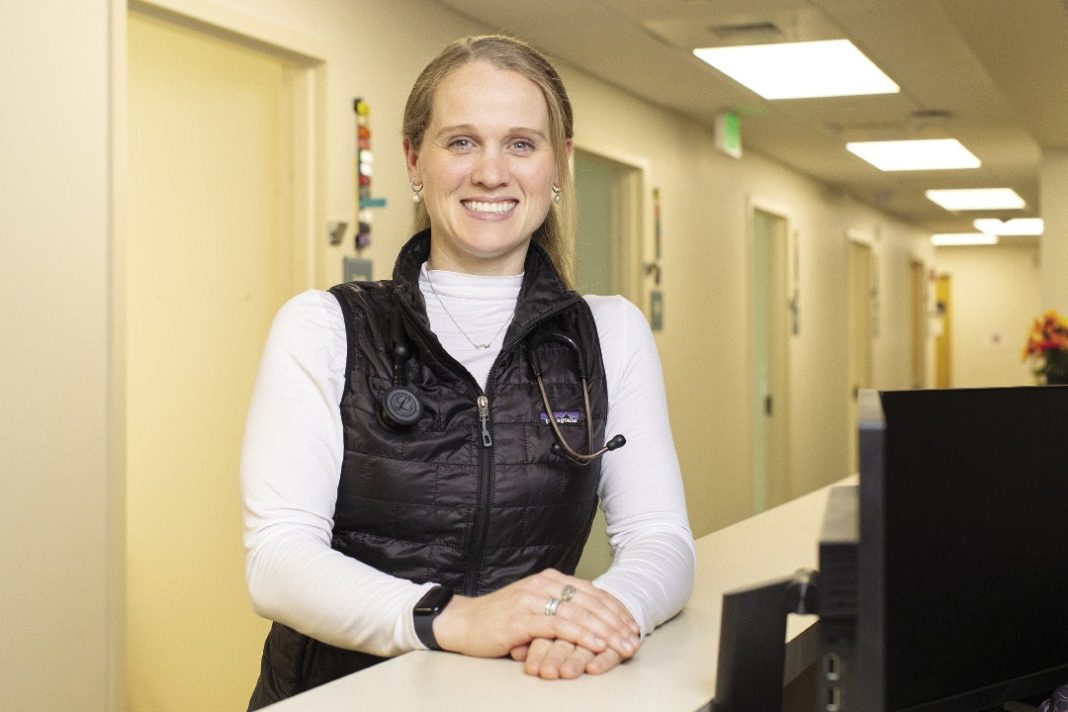In another life, Madeline Lane would be a school teacher. In this life, she’s a nurse practitioner at UMass Memorial Health – Harrington Hospital in Charlton, but that doesn’t mean her love for education has fallen by the wayside.
It’s quite the opposite.
“I felt like nursing was the best marriage of both education and medical science, because nurses are educators by trade,” said Lane.
Her commitment to teaching is at the forefront of her work in primary care; education paired with connection.
Lane sees many patients who miss the relationships they used to have with their doctor: that once-standard familiarity from decades prior when patients saw their primary care providers for a wider range of needs before the creation of more specialized fields.

“A lot of people mourn the loss of that feeling when you come in and see your doctor, or your nurse practitioner in my instance,” she said.
This sentiment rings particularly true for Mike Stowe, one of Lane’s patients and co-founder and senior partner at Westborough accounting firm Stowe & Degon. Stowe first met Lane when she substituted for his PCP, who was out on vacation.
“It was like the doctor that used to make house calls [that] you don’t see anymore. She does that,” he said. “When she filled in, the level of service, professional care, it was a whole new level that I had never experienced before.”
Stowe, who never thought he would choose a nurse practitioner as his primary provider, switched to Lane as his PCP within three visits.
Lane keeps detailed notes on not only her patients’ health, but also the little anecdotes that come up in a visit. If a patient’s son plays ice hockey or their partner also sees her, she’ll make a note.
Stowe said during his first appointment with Lane she insisted on knowing everything about his medical history for the past 20 years. She made sure to run a plethora of tests in the office, have him self-test at home, and followed up through email on nights and weekends.
When patients have a good relationship with their provider, they’re more likely to return and receive treatment to mitigate more acute health conditions, helping keep patients out of the hospital and lowering the chances of readmission, said Lane.
And for Lane, putting in the work to form connections with her patients doesn’t mean they have to be the same person or even have similar values. Instead, it’s about cultivating an environment where patients feel heard and respected.
“It’s nice to feel like you at least showed them that you’re in their corner before they leave,” she said.
An integral part of fostering a strong and informed provider-patient relationship is providing anticipatory guidance, said Lane. She actively puts in the forethought as to what patients can expect from their lab results, ultrasounds, or new medications in an effort to mitigate future issues.
“I’m not just going to say ‘Hey, we’re going to start you on this, and I’ll see you when you come back,’” said Lane. “I try to anticipate what questions they might have when they go home, because they’re there and they should be afforded that time.”
Preemptively giving patients information saves the patient time and energy by reducing the need to reach out later with questions, if they end up reaching out at all. If a patient isn’t informed about a temporary uncomfortable side effect to a treatment before starting, they won’t know it’s temporary and may discontinue use and subsequently care altogether. Putting in that extra time beforehand helps Lane practice preventative healthcare.
The times when patients do follow through with their treatments and have tangible positive outcomes are the most rewarding for Lane. Primary care providers don’t often experience instant gratification, so seeing her patients’ long-term efforts pay off is especially gratifying, she said.
“I get the most satisfaction when the work I do to educate and convince a patient to try something pays out … and then we reap the benefit of it,” she said.
Mica Kanner-Mascolo is a staff writer at Worcester Business Journal, who primarily covers the healthcare and diversity, equity, and inclusion industries.

